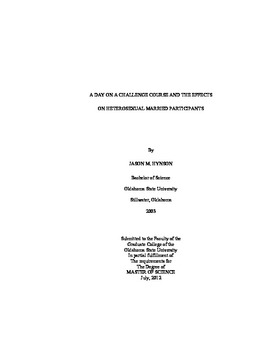| dc.description.abstract | Almost half of all marriages end in divorce (Amato, 2010). This study looked at one possible intervention to curb the rising statistic. Oklahoma State University Outdoor Adventure program has held a Valentine's Day event, Swinging with your Sweetie. During the event couples experienced some games and then completed the high challenge course as a team being supported by another couple on the ground. These events led to the following research questions. Can a day on the challenge course improve a couple's dyadic cohesion, consensus, marital satisfaction, and dyadic trust? Will a married couple experience team-building, group "we-ness", and shared meaning in a one day challenge course experience? The instruments used were the Revised Dyadic Adjustment Scale (Busby, Crane, Larson, & Christiansen, 1995) and the Dyadic Trust Scale (Larzelere & Huston, 1980). The instruments were given before the challenge course day began and at the end of the day. Overall research design was a non-random, pre/posttest design. Oklahoma State University's Challenge Course is unique in design. It allowed couples to participate together on the high course experience with another couple on the ground for transfers. The day on the course involved seven different married couples from Oklahoma. All but one of the couples had been married for five years or less. Three of the couples have children in their home. All the couples indicated they participate in leisure experiences including movies, walking, biking, climbing, and hunting. Participating couples also go on special events or dates at least several times a year. The study hypothesized married couples would show significant difference on the RDAS and the DTS instruments pre and posttests. It was also suspected there could be differences between the male and female participants. However, none of the null hypotheses were rejected based on the ANOVA statistical test. Although the study failed to reject the null hypotheses, the couples showed to be more homogeneous in their posttest scores. This was demonstrated by the variance change in pre/posttest scores. In addition to the variance the couples shared meaningful experiences purposefully chosen using John Gottman's Sound Relationship House (Gottman, 2011). The couple experience and group dynamics prove there was an impact, as one spouse mentioned, "this reminded us we need to do things like this more." | |
